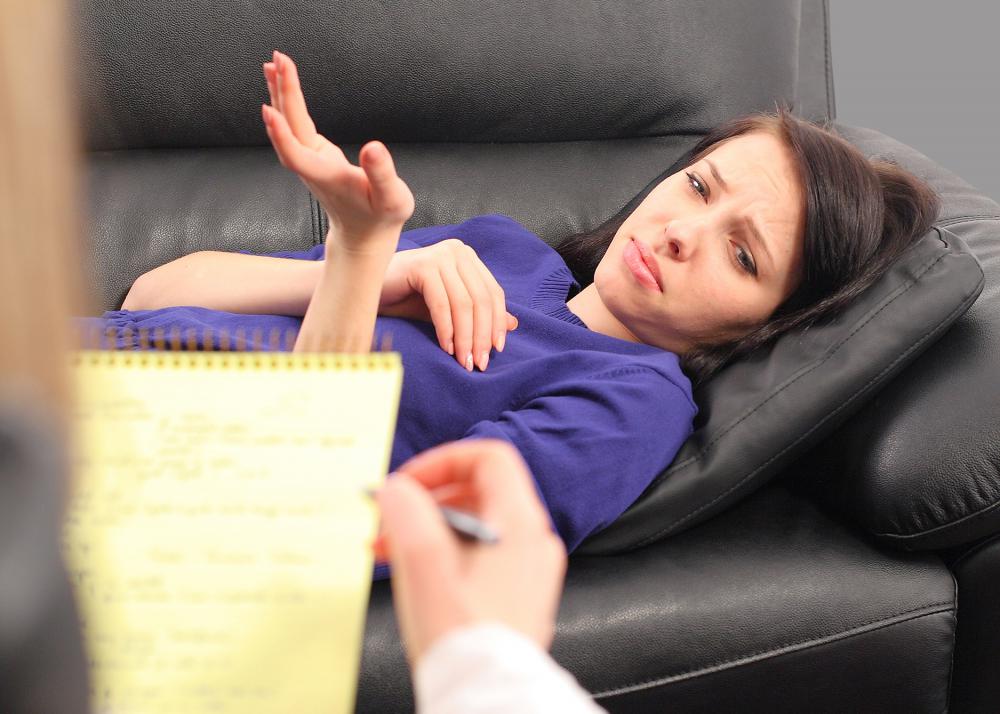At WiseGEEK, we're committed to delivering accurate, trustworthy information. Our expert-authored content is rigorously fact-checked and sourced from credible authorities. Discover how we uphold the highest standards in providing you with reliable knowledge.
What Are the Different Types of Person-Centered Therapy?
Person-centered therapy is a type of psychological therapy based on the humanistic perspective. This approach posits that each person is innately good, but may be improperly influenced by environmental factors. Person-centered therapy is also referred to as client-centered therapy, non-directive therapy, or Rogerian therapy, after the psychologist Carl Rogers who developed it. There are three types, or developmental phases, of person-centered therapy: nondirective psychotherapy, reflective psychotherapy, and experiential therapy.
Nondirective psychotherapy is considered phase one of person-centered therapy. This phase gives the therapist the ability to approach the patient permissively resulting in the patient feeling accepted. This is the main goal of nondirective psychotherapy, and it is designed to help patients achieve clarification and insight in their lives. The therapist accomplishes acceptance by treating the patient with unconditional positive regard (UPR) — a type of non-judgmental behavior the therapist portrays towards the patient making him feel accepted.

The second phase of person-centered therapy is reflective psychotherapy. A patient in this phase is allowed to develop congruence between the ideal self-concept, the way a person desires to be, and the real self-concept, how the person actually is. Therapists accomplish this by reflecting the feelings the patient displays, causing the patient to feel comfortable and trusting. The main goal in this phase is trust; the patient has to trust the therapist in order for any type of psychotherapy to end in success.

The goal of the therapist during experiential therapy, the third phase of person-centered therapy, is to create a safe relationship so the patient can value internal needs and understand emotions. Therapists can use empathy, the accurate awareness of the patient’s emotions, to create this relationship. During this phase, the therapist focuses on the patient’s self-actualization — his desire to fulfill his potential — by encouraging him to experience and express his feelings rather than repress them.

Person-centered therapy has achieved successful results in patients suffering from psychological disorders including schizophrenia, depression, and substance abuse. This form of therapy is commonly used in individual cases as well as in group therapy and family therapy. If appropriately conducted, person-centered therapy can result in the patient having higher self-esteem and a positive outlook on life. After successful treatment, patients may appear open to change and new experiences regardless of their mental illness. The stable relationship and trust they build with their therapist helps patients achieve stability and trust in other relationships.
AS FEATURED ON:
AS FEATURED ON:

















Discussion Comments
@wander - It can take a long time for people undergoing person centered therapy to make enough progress so that others around them will start to notice differences in their personality. My aunt underwent therapy for her alcoholism and it took her over a year just to get to a place where she could freely talk about what was bothering her.
I think that with any kind of psychology based therapy that it really depends on the willingness of the getting help that can help them make progress. For some people it takes a few months to improve, for others years. I think all you can do is wait and be supportive.
I wonder how long it takes for one to reach their person centered therapy goals? My friend is currently undergoing sessions with a counselor to help him deal with his depression. He has been suffering for years and his family finally got him some professional help.
I have done some reading and it seems to me that person centered therapy techniques are quite popular and have a high chance of success. I would love to see my friend be able to live life again without so much despair. We've all tried talking to him over the years and we've offered our support, but there is only so much family and friends can do for someone who is truly depressed.
Wow, I didn't know that schizophrenia could be treated with therapy. I thought that you had to have hardcore drugs and be committed to an institution for this illness.
I guess if the therapist could sort out the reasons for the voices and multiple personalities, this could help the patient to see why they break apart like this. I just assumed that it was a result of some chemical imbalance that could only be corrected with medication.
That's wonderful if person-centered therapy alone could bring a schizophrenic back to the realm of sanity. I have heard of troubled kids developing it after a traumatic event in their lives, so maybe this type of accepting therapy can create an environment supportive enough for them to unleash their scary inner emotions.
@kylee07drg - My mother repressed her feelings, and it nearly killed her. Anyone who experiences physical symptoms that are likely caused by emotional issues should seek psychiatric help. Doctors can give you blood pressure and anti-anxiety medication, but that only masks the source of the problem.
My mother's boss pushed her around a lot at work. She got a disproportionate amount of the workload dumped on her desk, and it started to affect her heart.
Instead of speaking up about how she felt, she held it in and did whatever he asked. On a particularly stressful day, she had a heart attack.
As she lay on the hospital bed, she vowed to get help. After a few person-centered therapy sessions, she knew what she had to do to become well.
She confronted her boss, and he actually apologized for putting so much on her. He redistributed the workload, and she felt so relieved and happy after that.
The most healthy thing a person can do is get their emotions out. Repressing them can do so much harm, both mentally and physically.
I repressed my anger toward my husband for years. This resulted in high blood pressure, panic attacks, and depression.
I underwent person-centered therapy, and I was delighted that my therapist actually wanted to hear my thoughts and feelings. It felt so good and freeing to finally release them and verbalize them.
My therapist encouraged me to sit down and have a long talk with my husband. He told me to hold nothing back, because I was slowly killing myself by doing so.
My husband and I had that talk, and it felt really cathartic. I felt closer to him after that, and my physical symptoms went away, as well.
A troubled person absolutely has to trust their therapist in order to gain any benefit from the sessions. If the therapist is judgmental or confrontational at all, this will cause the patient to clam up and run away.
It's the same as having a good friend. If you have someone whom you can tell anything without worrying about what they will think or say about you, then you will feel so much better. A therapist is guaranteed to do that, whereas most friends are not.
I think that person-centered therapy is a great approach to treating people who are obviously troubled about their thoughts and feelings. Likely, they are feeling some degree of guilt, and this type of therapy can relieve them of that.
@BrickBack - You know I was watching a program about people that had food disorders. Some of the people were addicted to food and others were anorexic. They had a therapist that made them take personal responsibility for their lives.
Many of these people had tragic childhoods which are what a lot of them were holding on to but the therapist forced these people to confront their reality that they are now responsible for the quality of their lives and can no longer blame their parents for their problems.
Many resisted at first because the reality was painful, but most of the people featured on the program got better because they stop allowing their past to victimize their future and embraced this form of person centered therapy.
I think that a person-centered therapy approach really values the individual and it is easy to see how a person can overcome problems that they are struggling with because it takes a very positive approach.
I think that some people that are suffering from various issues sometimes feel like they are somehow defective and this form of person centered therapy helps to restore the individual’s value as a person so that they could move forward.
The patient really has to have increased self-esteem in order for the therapy to be effective in the long run because it is from this positive view of themselves that they learn to make different choices that will enhance the quality of their life.
I also think that this type of Gestalt therapy allows a person to have hope for their future because they realize that they have the power to change their circumstances and are not stuck in blaming another person in their life like other psychological therapies do.
The fact is if a person stays with the victim mentality their life will never get better. Personal responsibility goes a long way in shaping a person’s future for the better.
Post your comments